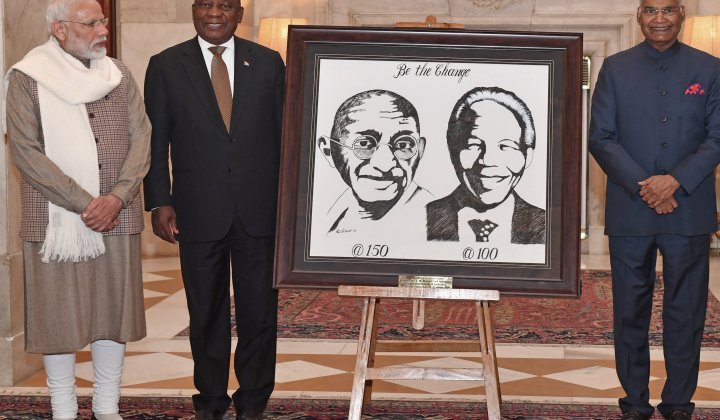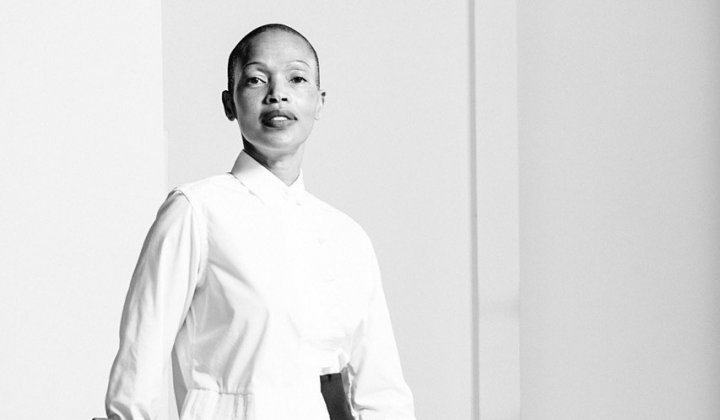On 25 June 2020, the school held a virtual townhall to facilitate sensing and sense making of the global conversation around racial injustice, inequality and the rising voice of the #BlackLivesMatter movement, accelerated in the wake of the brutal killing of George Floyd in the US. The aim was to look at the worldwide protests and activism around race, the visible reminders of colonialism and the urgent need for meaningful transformation around the world. The intention was to bring the conversation back to a reflection of race in the South African context, while bearing in mind the global nature of this discussion.
In order to create a safe and inclusive space within the confines of a digital experience, the event began with the open sharing of reflections among all delegates, facilitated by Interim Dean, Dr. Morris Mthombeni. Participants were then divided into small breakaway rooms for private discussions and sharing. Finally, as part of plenary, feedback was shared before Professor Nicola Kleyn wrapped up the event.
In light of the delicate nature of the discussions, it was decided not to record the session. As a result, participants were able to share freely, guided by 15 GIBS facilitators who helped moderate and direct the conversation.
While a wide range of personal and far-reaching observations were shared, a single, central view emerged time and again: we continue sharing our experiences, pain and aspirations in order shape our future.
Constant engagement is critical
Floyd’s death sparked a number of discussions among GIBS students over platforms such as WhatsApp which, highlighted the ongoing frustration of many, the negativity around race-based discussions and life experiences, especially in the work place. Divisions still exist among South Africans. This outlined why continuous conversations around these tough topics was so essential. As one participant observed: “The issue of race must not be a once-off event, but a constant engagement.”
After the breakaway sessions several issues that were standing in the way of pro-active engagement were raised in the facilitated plenary session, including the issue of ‘white’ silence. While some observed that simply through listening, white people were being exposed to vital and different viewpoints, others lamented that “conversations at GIBS about race are always one-sided. We don’t get to hear the white voices.”
This was mirrored in the corporate reality. Many white people were nervous or felt guilty about participating in these discussions, or only took part in front of lecturers or leaders so they could be seen to be engaging, was one observation. But, irrespective of the reasoning, it was widely held that GIBS had a role to play in ensuring that honest discussions, where all voices could be heard, take place. It was acknowledged that this already formed part of the curriculum, but involves regular, structured engagements facilitated by the business school beyond the prescribed core courses.
A microcosm of social change
For many participants these discussions were critical if GIBS students were to return to the corporate setting and be in a position to influence change at that level. As one student observed: “By virtue of having a place at the table, we have a responsibility to not just be outraged on Twitter. We should be changing the system.”
It was encouraging to note that several participants highlighted the diversity of the GIBS experience, from the make-up of the student body to the diversity of the faculty. This alone ensured an environmental mix which was conducive to creating understanding. Some contended that this unique vantage point should be harnessed more to drive racial awareness, to have deeper conversations about race and encourage students to advocate for social transformation.
To this end, GIBS was encouraged to be more proactive in creating spaces for ongoing discussions, rather than continuing to follow a more organic approach. It was time, one student observed, to challenge the sanitised, politically correct and deliberate nature of debate around race and racial biases at GIBS.
GIBS was also urged by the students to create more case studies that tell positive African stories.
Deep concerns about gender-based violence
Linked to the observation that racism isn’t always clearly visible until something happens to highlight entrenched bias, was the deeply felt issue of pervasive gender-based violence in South Africa, a conversation thread that was raised early in the discussion and which permeated the evening’s insights.
While the spotlight globally was very much on issues of race at the moment, there was a widespread view that now was the time to discuss endemic issues in society, including gender-based violence. It was critical to arrive at a point where the gender-based violence conversation was taken seriously in order to begin fixing the system. But this started with becoming “comfortable with having uncomfortable discussions”.
It was generally agreed that there was a need to be intersectional about the issue of race and gender-based violence, particularly in the South African setting. The fact that gender-based violence accelerated across South Africa at the same time as #BlackLivesMatter calls were resonating globally, was telling in terms of considering the different experiences of black females compared with black males and white females.
To decouple race and gender, not even looking at class, does a disservice to black women, was one observation.
Again this brought the conversation back to ongoing engagements about race, about feelings of white guilt and fear, about gender, bias and personal experiences. Safe spaces in which the GIBS community as a whole could talk about these issues, in spite of the heavy emotional toll it might bring, was seen as an essential step.
To this end, GIBS committed to creating more opportunities to tackle uncomfortable topics and broadly issued an invitation to all participants, as well as members of the GIBS community, to keep talking, to keep moving forward, to keep learning, to keep listening, and to use the school’s position of privilege to drive social change.
As Mthombeni concluded: “We are holding pain, but we want to use that pain for good.”
We don’t get to hear the white voices...
... racism isn’t always clearly visible...




